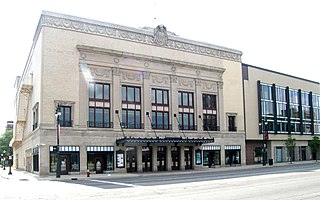
The Detroit Symphony Orchestra (DSO) is an American orchestra based in Detroit, Michigan. Its primary performance venue is Orchestra Hall at the Max M. Fisher Music Center in Detroit's Midtown neighborhood. Jader Bignamini is the current music director of the Detroit Symphony Orchestra, with Jeff Tyzik as Principal Pops Conductor, Enrico Lopez-Yañez as Principal Pops Conductor Designate, and Na'Zir McFadden as assistant conductor. Leonard Slatkin, the previous music director, is the orchestra's current music director laureate. Neeme Järvi, music director from 1990 to 2005, is the orchestra's current music director emeritus.

Violator is the seventh studio album by English electronic music band Depeche Mode. It was first released on 19 March 1990 by Mute Records internationally, and by Sire and Reprise Records in the United States.

Leonard Edward Slatkin is an American conductor, author and composer.

"Don't Cry for Me Argentina" is a song recorded by Julie Covington for the 1976 concept album Evita, later included in the 1978 musical of the same name. The song was written and composed by Andrew Lloyd Webber and Tim Rice while they were researching the life of Argentine leader Eva Perón. It appears at the opening of the first and second acts, as well as near the end of the show, initially as the spirit of the dead Eva exhorting the people of Argentina not to mourn her, during Eva's speech from the balcony of the Casa Rosada, and during her final broadcast.

Live Peace in Toronto 1969 is a live album by the Plastic Ono Band, released in December 1969 on Apple Records. Recorded at the Toronto Rock and Roll Revival festival, it was the first live album released by any member of the Beatles separately or together. John Lennon and his wife Yoko Ono received a phone call from the festival's promoters John Brower and Kenny Walker, and then assembled a band on very short notice for the festival, which was due to start the following day. The band included Eric Clapton, Klaus Voormann, and drummer Alan White. The group flew from London, and had brief unamplified rehearsals on the plane before appearing on the stage to perform several songs; one of which, "Cold Turkey", was first performed live at the festival. After returning home, Lennon mixed the album in a day.
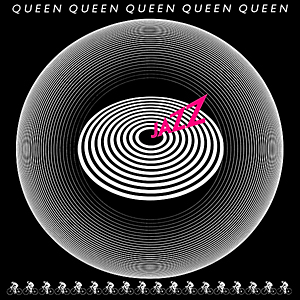
Jazz is the seventh studio album by the British rock band Queen. It was released on 10 November 1978 by EMI Records in the United Kingdom and by Elektra Records in the United States. Produced by Roy Thomas Baker, the album artwork was suggested by Roger Taylor, who previously saw a similar design painted on the Berlin Wall. The album's varying musical styles were alternately praised and criticised. It reached number two in the UK Albums Chart and number six on the US Billboard Top LPs & Tape chart.

Julie London was an American singer and actress whose career spanned more than 40 years. A torch singer noted for her contralto voice, London recorded over thirty albums of pop and jazz standards between 1955 and 1969. Her recording of "Cry Me a River", a song she introduced on her debut album Julie Is Her Name, was inducted into the Grammy Hall of Fame in 2001. In addition to her musical notice, London was nominated for a Golden Globe Award in 1974 for her portrayal of Nurse Dixie McCall in the television series Emergency!

"See Emily Play" is a song by the English rock band Pink Floyd, released as their second single on 16 June 1967 on the Columbia label. Written by original frontman Syd Barrett, it was released as a non-album single, but appeared as the opening track of Pink Floyd, the US edition of the band's debut album The Piper at the Gates of Dawn (1967).

Valley Girl is a 1983 American teen romantic comedy film directed by Martha Coolidge and written and produced by Wayne Crawford and Andrew Lane. Loosely based on the tragedy Romeo and Juliet by William Shakespeare, the film centers on the romance between a valley girl and a city punk. Michelle Meyrink, Elizabeth Daily, Cameron Dye and Michael Bowen appear in supporting roles.

Nice 'n' Easy is the eighteenth studio album by Frank Sinatra, released on July 25, 1960.
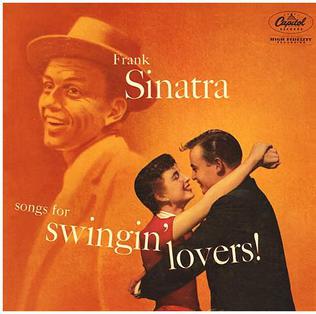
Songs for Swingin' Lovers! is the tenth studio album by American singer Frank Sinatra, and his fourth for Capitol Records. It was arranged by Nelson Riddle and released in March 1956 on LP and January 1987 on CD. It was the first album ever to top the UK Albums Chart.

Songs for Young Lovers is the seventh studio album by Frank Sinatra and his first on Capitol Records. It was issued as an 8-song, 10" album and as a 45rpm EP set, but it was the first Sinatra "album" not to have a 78rpm multi-disc-album release. In 2002, it was one of 50 recordings chosen that year by the Library of Congress to be added to the National Recording Registry.

No One Cares is the seventeenth studio album by Frank Sinatra, released on July 20, 1959. It is generally considered a sequel to Sinatra's 1957 album Where Are You?, and shares a similar sad and lonesome, gloomy theme and concept as In the Wee Small Hours and Only the Lonely.
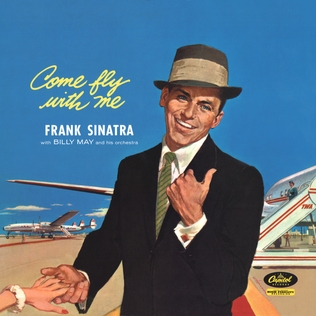
Come Fly with Me is the fourteenth studio album by American singer Frank Sinatra, released in 1958.

Ring-a-Ding-Ding! is the twentieth studio album by Frank Sinatra, released on May 7, 1961. It was the inaugural record on Sinatra's Reprise label and, as the initial concept was "an album without ballads", it consisted only of uptempo swing numbers.
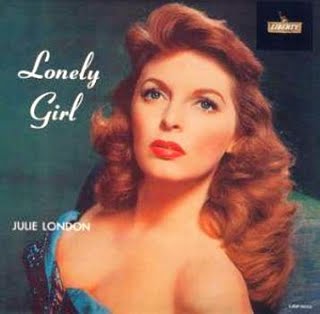
Lonely Girl is an LP album by Julie London, released by Liberty Records under catalog number LRP-3012 as a monophonic recording in 1956, and later in rechanneled stereo under catalog number LST-7029 in 1959.

London by Night is an LP album by Julie London, released by Liberty Records under catalog numbers LRP-3105 in monaural and LST-7105 in stereophonic form in 1958. The accompaniment was by Pete King and His Orchestra.

Robert Lamar Thompson was a composer, arranger, and orchestra leader from the 1950s through the 1980s. Active in Los Angeles, Thompson was a recording artist for RCA Victor and Dot Records, scored film and television soundtracks, and wrote musical accompaniments for commercials. He composed, arranged, and conducted the orchestra for such wide-ranging artists as Rosemary Clooney, Mae West, Julie London, Bing Crosby, The Andrews Sisters, Chet Atkins, Duane Eddy, Judy Garland, Jerry Lewis, and Phil Ochs.
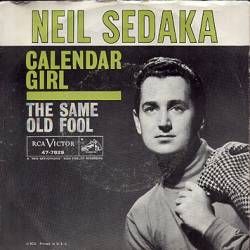
"Calendar Girl" is a song by Neil Sedaka. The music was composed by Sedaka and the lyrics by Howard Greenfield. Released in December 1960 as a single, it was a hit single for Sedaka, peaking at No. 4 on the US charts, No. 3 in Australia, and No. 1 on the Canadian and Japanese charts.

The discography of American jazz singer Julie London consists of 29 studio albums, one live album, six compilation albums, two additional albums, and 29 singles. After a moderately successful film career, London signed a recording contract with the newly formed Liberty Records in 1955. Her debut single "Cry Me a River" reached number nine on the Billboard Hot 100 in 1955. In June 1957, it would also peak at number twenty-two on the UK Singles Chart. "Cry Me a River" became London's most successful and highest-selling single of her musical career. The single would sell three million copies in total. Her debut studio album Julie Is Her Name was issued in December 1955 and reached the second position on the Billboard 200 albums chart. London's next three studio releases, Lonely Girl (1956), Calendar Girl (1956), and About the Blues (1957), reached the top-twenty of the Billboard 200 survey as well.




















